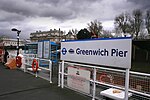Cutty Sark is a British clipper ship. Built on the River Leven, Dumbarton, Scotland in 1869 for the Jock Willis Shipping Line, she was one of the last tea clippers to be built and one of the fastest, coming at the end of a long period of design development for this type of vessel, which halted as steamships took over their routes.
After the big improvement in the fuel efficiency of steamships in 1866, the opening of the Suez Canal in 1869 gave them a shorter route to China, so Cutty Sark spent only a few years on the tea trade before turning to the trade in wool from Australia, where she held the record time to Britain for ten years. Continuing improvements in steam technology meant that gradually steamships also came to dominate the longer sailing route to Australia, and the ship was sold to the Portuguese company Ferreira and Co. in 1895 and renamed Ferreira. She continued as a cargo ship until purchased in 1922 by retired sea captain Wilfred Dowman, who used her as a training ship operating from Falmouth, Cornwall. After his death, Cutty Sark was transferred to the Thames Nautical Training College, Greenhithe in 1938 where she became an auxiliary cadet training ship alongside HMS Worcester. By 1954, she had ceased to be useful as a cadet ship and was transferred to permanent dry dock at Greenwich, London, for public display.
Cutty Sark is listed by National Historic Ships as part of the National Historic Fleet (the nautical equivalent of a Grade 1 Listed Building). She is one of only three remaining original composite construction (wooden hull on an iron frame) clipper ships from the nineteenth century in part or whole, the others being the City of Adelaide, which arrived in Port Adelaide, South Australia on 3 February 2014 for preservation, and the beached skeleton of Ambassador of 1869 near Punta Arenas, Chile.
The ship has been damaged by fire twice in recent years, first on 21 May 2007 while undergoing conservation. She was restored and was reopened to the public on 25 April 2012. Funders for the Cutty Sark conservation project include: HLF, DCMS, Sammy Ofer Foundation, Greenwich Council, Greater London Authority, The Stavros Niarchos Foundation, Berry Brothers & Rudd, Michael Edwards, Alisher Usmanov.On 19 October 2014 she was damaged in a smaller fire.Cutty Sark whisky derives its name from the ship. An image of the clipper appears on the label, and the maker formerly sponsored the Cutty Sark Tall Ships Race. The ship also inspired the name of the Saunders Roe Cutty Sark flying boat.










